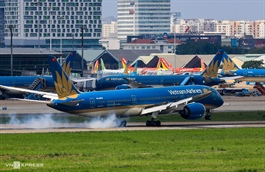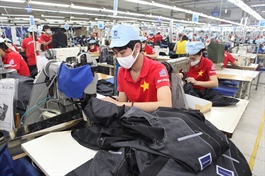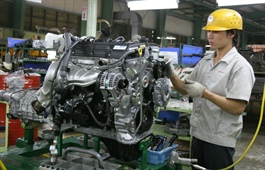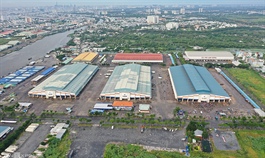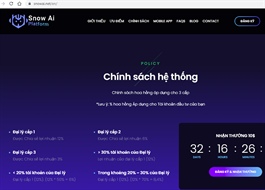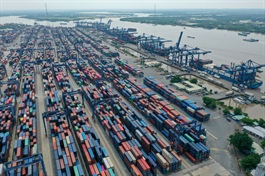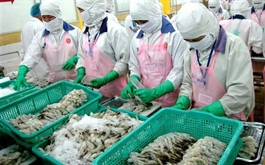Vietnam should tap silver linings to reach next level amid COVID-19: ex-WB country director
Vietnam should tap silver linings to reach next level amid COVID-19: ex-WB country director
A former country director to Vietnam, Kwakwaworks as World Bank (WB) Regional Vice President for East Asia and the Pacific.
“It shows some solidarity by speaking with your friends, your clients, at a time when they need encouragement and need to know that they're not alone,” Kwakwa stressed in a recent exclusive interview with Tuoi Tre (Youth) newspaper via the Internet.
The interview was conducted against a backdrop of Vietnam battling the worst-ever COVID-19 wave that erupted in late April.
The country has since recorded nearly 20,000 domestic infections, more than 10 times the combined number of cases logged in the previous three rounds.
Over 100 deaths have been confirmed since the virus first struck the nation early last year.
The government has closed the borders while social distancing restrictions have been in place in most of the country's provinces and cities to stall viral transmission.
Vietnam’s estimated growth of 4-5 percent
Why did you choose to visit Vietnam in-person at this time?
It's always good to have the vice president engaging with a new government primarily to express the bank's continued support for the country, to hear from the new government on what their priorities are and how the bank can support them.
And I would have come much earlier. As soon as I got fully vaccinated, I was looking for an opportunity to come and to engage with the clients. I'm delighted that the government had these special arrangements that could be made for dignitaries to enter Vietnam.
It is a fantastic opportunity to come back, to reconnect with old friends, with counterparts, with colleagues.
The visit happened amid the fourth wave of COVID-19 in Vietnam. It's become critical to really have vaccines as part of the strategy. The government is trying to have contracts with various suppliers. I really hope that these vaccines will come on time, so that they can be deployed and complement testing, tracing, and isolation to really help the government go back to the fantastic success that it had last year and in the earlier part of this year in controlling the pandemic.
Is it possible for Vietnam to achieve the growth target of 6.5 percent in 2021 as the country is struggling with the fourth wave of COVID-19?
It really depends on how disruptive these new variants are because that is what determines whether you're able to fully carry out economic activity, whether you have to keep certain parts of the economy closed, or whether you can open it.
Right now, our projections suggest that the economy can grow at maybe four to five percent. Vietnam was one of the countries where exports resumed quite fast and Vietnam was able to capitalize on exports of electronics, where there was a huge increase in demand as people switched to work from home.
Any economic projection will also be a bit tentative because we have to see how things happen in terms of vaccinations so that people can carry out economic activities safely.
We're generally optimistic about the growth prospects, but there are significant headwinds in this particular wave.
On the macroeconomic front, we are confident that both the State Bank of Vietnam and the Ministry of Finance will continue to be included in the management of fiscal monetary and fiscal policy respectively, in a way that there's sufficient support provided to economic growth, without causing major macroeconomic disruption.
I think the question that needs to be answered is the role of monetary policy, as interest rates by now are quite low.
To which extent do you think Vietnam will complete its dual target of pushing back the pandemic and spurring the economy?
Vietnam has done a remarkable job in containing COVID-19. The government had a very effective testing, tracing, isolation, and treatment approach that worked well to keep the infection numbers low and mortality rates at zero for a very long time. As a result, Vietnam was able to reopen large parts of its economy.
As the virus is evolving and becoming more resistant, stronger, and more difficult to manage, vaccinations will be super critical alongside testing, tracing, and isolation.
Vietnam trades a lot with the U.S. and the EU, which are getting their vaccination programs underway. The import demand will come back up. Vietnam will have more of a possibility to export to these countries and to start trade with them.
It is possible for Vietnam to achieve the dual target but vaccines will be very important. If the vaccination strategy is successful, I don't see why Vietnam cannot reopen and restart.
Silver linings
What are the WB’s recommendations for Vietnam in designing relief packages?
In the first instance, you need to be able to provide broad support to all segments of the population and the economy, particularly the most vulnerable from small- and medium-scale enterprises, women, households, and large firms.
In most countries, social protection and safety net programs have been really instrumental in shielding people.
First of all, Vietnam needs programs that save lives by strengthening its health system, making sure that people have access to the treatment they need, and so on.
The other part of it is about protecting the most vulnerable people that have very little to fall back on if they lose their job.
The third is having programs to support businesses because their closure also means that you're putting people on the streets without jobs. It is helpful to give them wage subsidies, meaning the government pays part of the wages of their workers so that they don't have to fire all their employees. We saw Indonesia implementing the policy and that was supportive. We found other countries also deferring taxes.
Another thing that has been really helpful is using digital technology to give support to people. Instead of very bureaucratic ways of delivering the relief package, the use of technology helps to really put money in people's hands. We've seen that in several countries where sometimes the governments have made commitments of certain amounts, but it's been very slow to implement.
The pandemic has severely affected every individual and business in Vietnam; however, the saying goes, “every cloud has a silver lining.” What is it?
I think that every cloud has a silver lining. Every challenge is, in some respects, an opportunity. Vietnam has already got some benefits, especially from the demand for electronic exports related to the COVID-19 pandemic.
Thanks to initial success in controlling the pandemic, a lot of foreign direct investment (FDI) flows that would have gone to other countries came to Vietnam.
The health crisis provides a great opportunity for Vietnam to accelerate and deepen its digitalization agenda. Mobile money, for example, can help include a lot of people in banking. The increase in digitalization also has applications in medicine and education.
I think another silver lining is an opportunity for countries to look at how we can be as competitive as possible and what reforms we need to speed up. This is also an opportunity to see where the structural reform agenda starts in order to pick it up and to go higher. These are some examples of silver linings that can be tapped to take Vietnam to the next level.
You had five years working in the U.S. after leaving Vietnam. How is Vietnam in the eyes of the U.S. business community?
FDI has been a big part of the country's success over the last few decades. Vietnam has been very successful in attracting foreign direct investment, including flows from the U.S. There's a lot of understanding of Vietnam and there's a lot of interest in Vietnam. People see Vietnam as a place of opportunity that can provide some of the returns they would like to see on their investment.
There's still work to be done in improving the business environment so that economic activities by the private sector can happen more easily. Institutions are important in that regard. The Vietnam Business Forum (VBF) where the government has regular engagement with the private sector is really important in creating a platform for dialogue and access to conversations, to identify problems and to solve them together. The view is generally positive. However, Vietnam has more difficulty attracting infrastructure investment. We need to work with the governments to understand what the problem is and find solutions so that we can also get the private sector participating more actively in infrastructural development.







